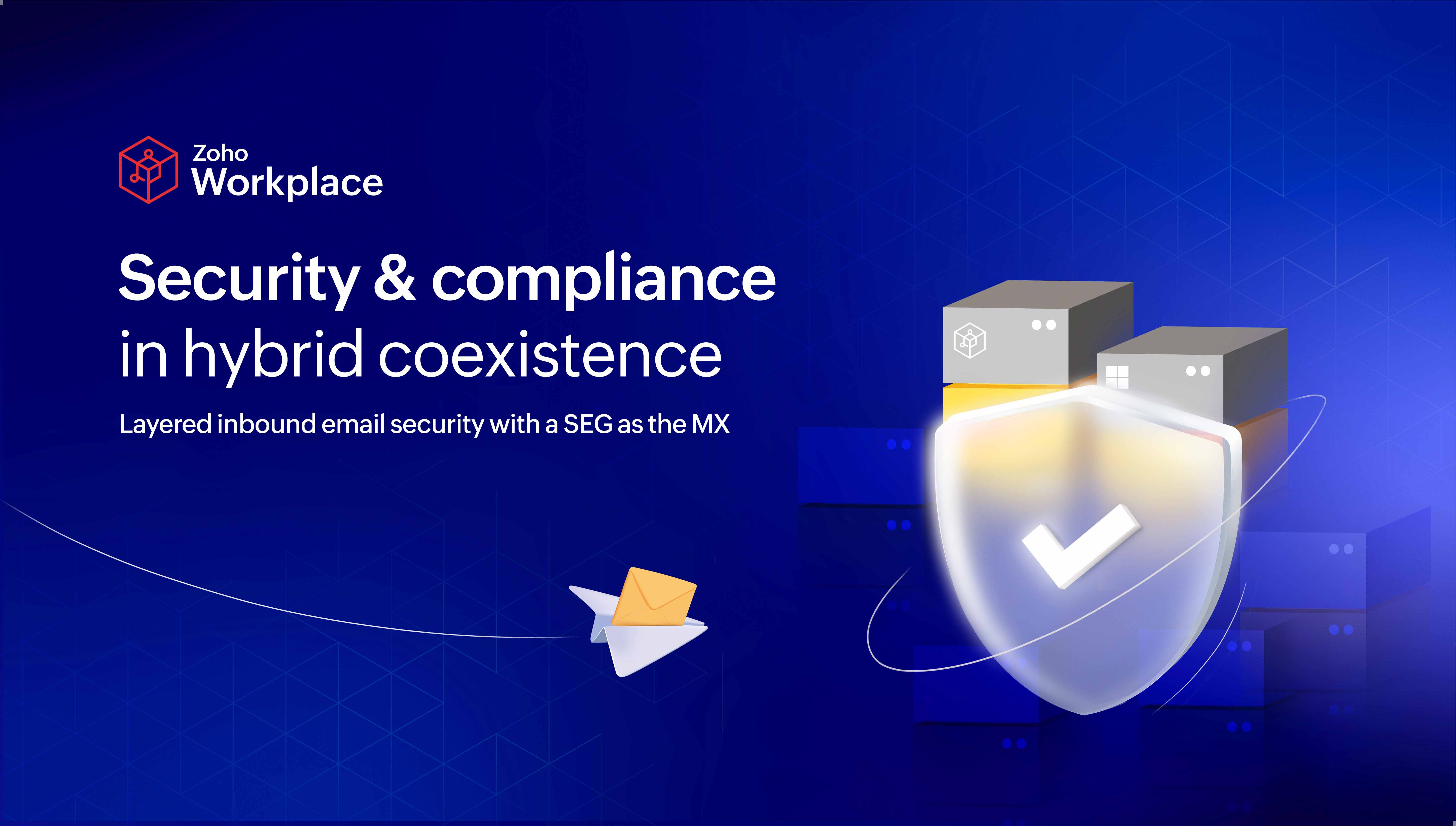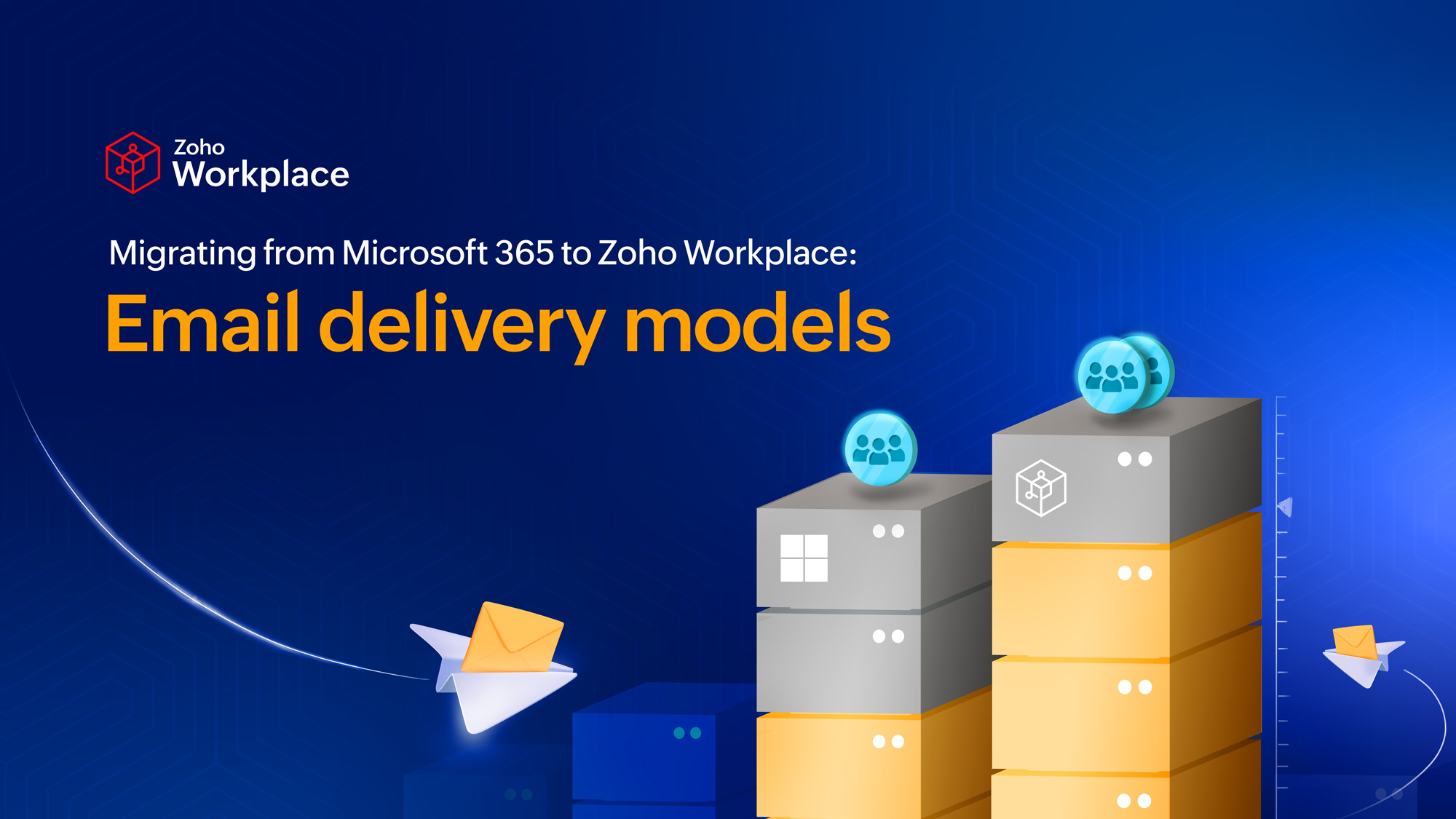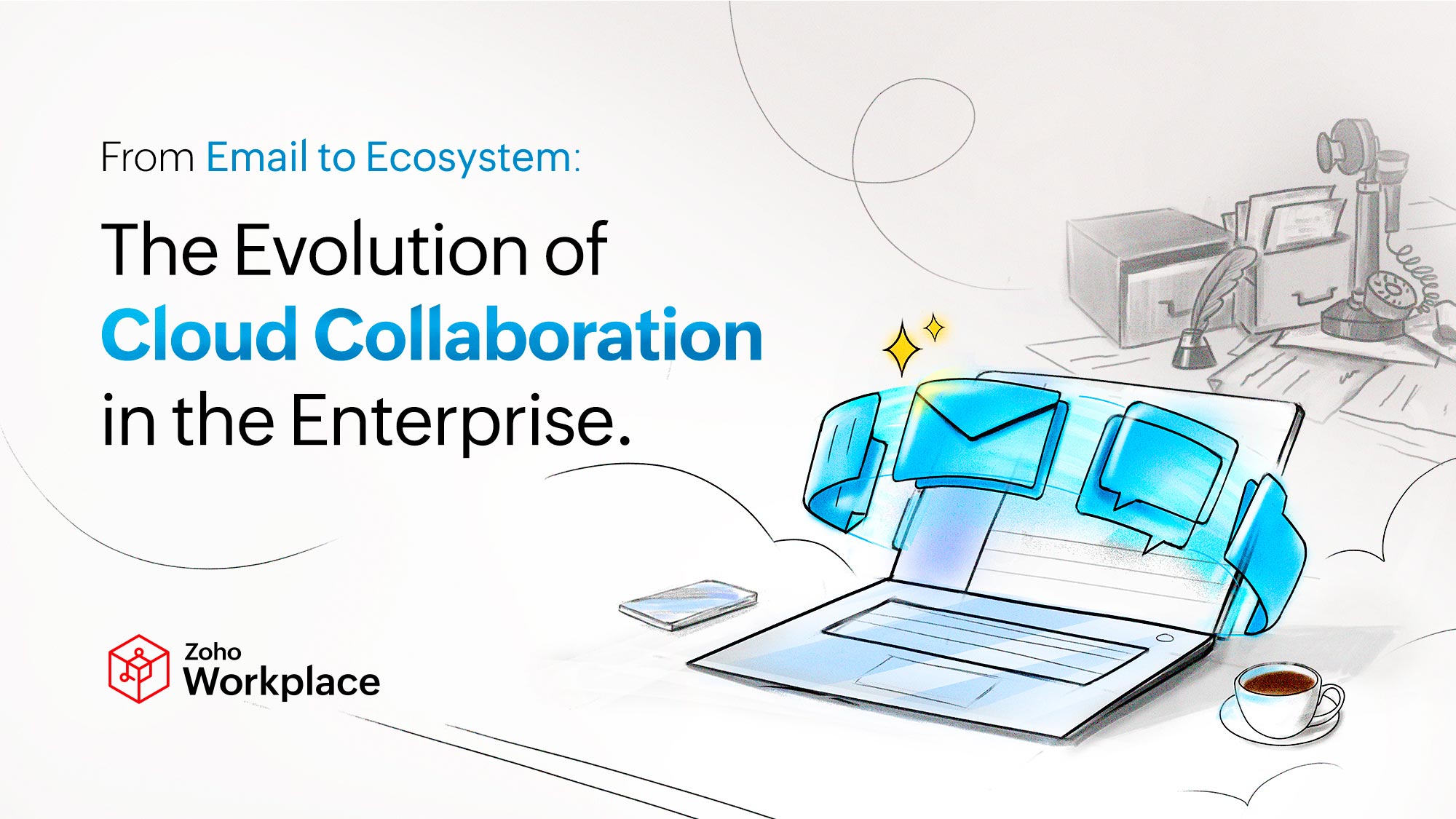- HOME
- All Products
- Business emails: embracing efficiency and security in the workplace
Business emails: embracing efficiency and security in the workplace
- Published : August 21, 2023
- Last Updated : October 27, 2023
- 1.2K Views
- 8 Min Read
Efficient and secure communication lies at the heart of any successful organization. In this second installment of our series on types of emails, we focus on the pivotal role of business emails in fostering seamless interactions. As you dive into the world of strategic workplace communication, remember that each article in this series sheds light on a different dimension of emails, offering you a comprehensive perspective on their multifaceted influence.
Read more:
- Email automation: Streamlining operations in the workplace
- Marketing emails: Harnessing the power of customer-centric strategies
- Emails that matter: Transactional email
- Behind the scenes: How operational emails synchronize IT and enterprise workflows
The number of global e-mail users is set to grow to 4.48 billion users in 2024. (Statista, 2020)
The daily operations of businesses and organizations are significantly influenced by the use of email in the workplace. Today, email serves as more than just a means of communication; it’s a crucial part of business development, creating process workflows, approving transactions, and other operations.
Specifically designed to conduct business, business email is a crucial tool for both internal and external professional communications. Operating under a custom domain, business emails adhere to specific criteria, ensuring increased security, data privacy, and access to business-specific features.
This article explores the various facets of business email while addressing issues with storage, attachment size, privacy, and security. It also examines various hosting services, the vendor landscape, integration with other business tools, evolving features, and the arrival of AI-driven capabilities - all that you need to look into before you create an email account.
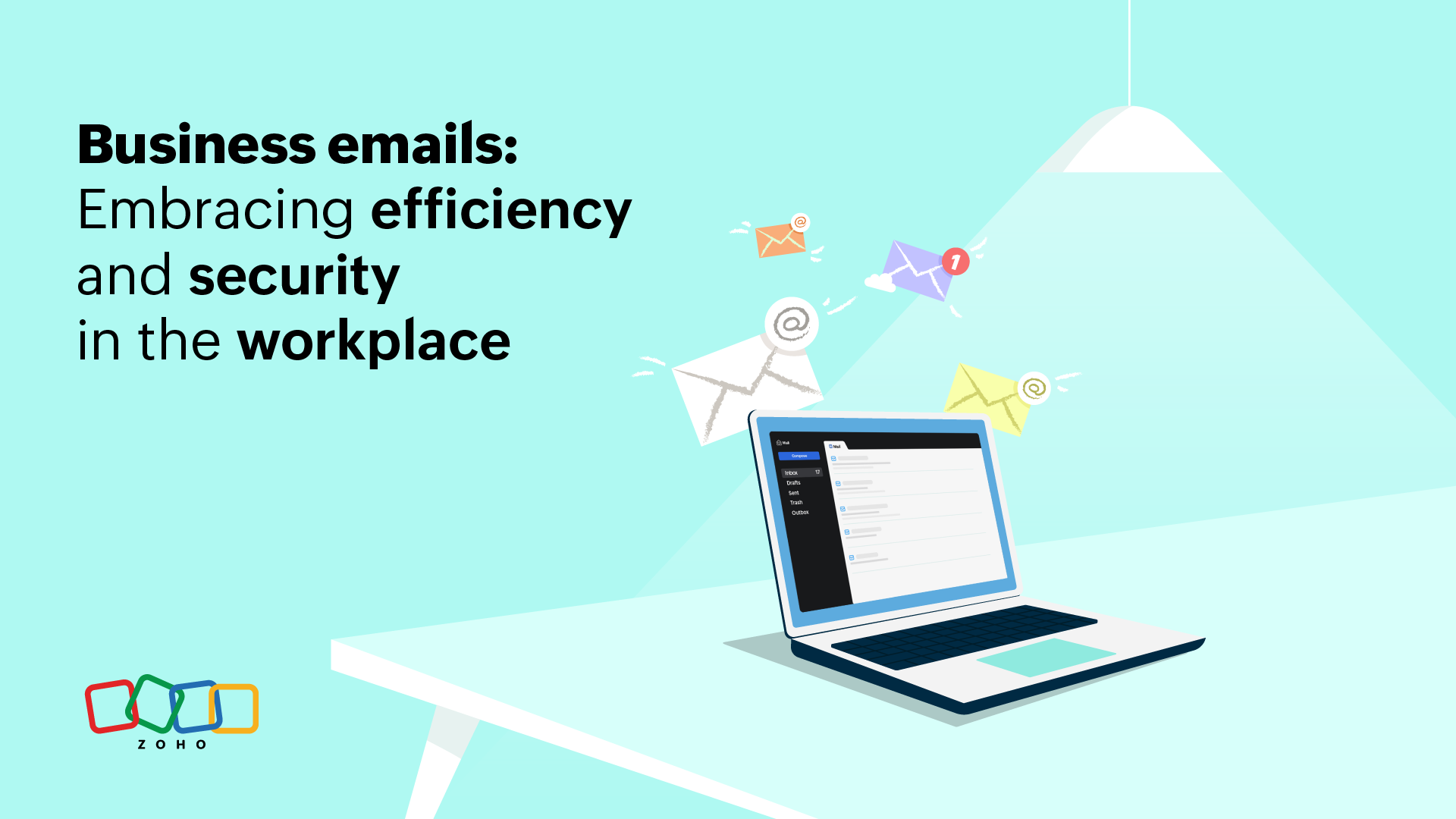
Different types of email hosting services
Business email services can be hosted through on-premise solutions or cloud-based platforms. On-premise hosting involves setting up and managing email servers within the organization's infrastructure. This approach offers more control over data and customization options, making it ideal for companies with specific security and compliance requirements. However, on-premise hosting may require substantial initial investments in hardware, software, and IT expertise for maintenance.
Alternatively, cloud-based email hosting relies on third-party providers who manage the servers, offering scalable and cost-effective solutions. The market for business email services is diverse, with numerous vendors catering to a wide range of organizational needs. Industry giants like Microsoft Office 365, Google Workspace, and Zoho Workplace offer comprehensive solutions with a vast array of features, including automatic updates, enhanced security measures, access to applications from various devices, and seamless integration with other native tools such as Docs, Sheets, and team chat, all of which streamline workflows and enhance productivity.
Apart from these industry leaders, several other vendors cater to specific niches and unique requirements. For example, Rackspace Email focuses on reliable email hosting with a strong emphasis on customer support, making it a preferred choice for businesses seeking personalized assistance. Proton Mail emphasizes end-to-end encryption and privacy, making it a popular choice for organizations handling sensitive information, such as those in the healthcare and financial sectors.
Below is a list of different email service providers and their respective specialties.
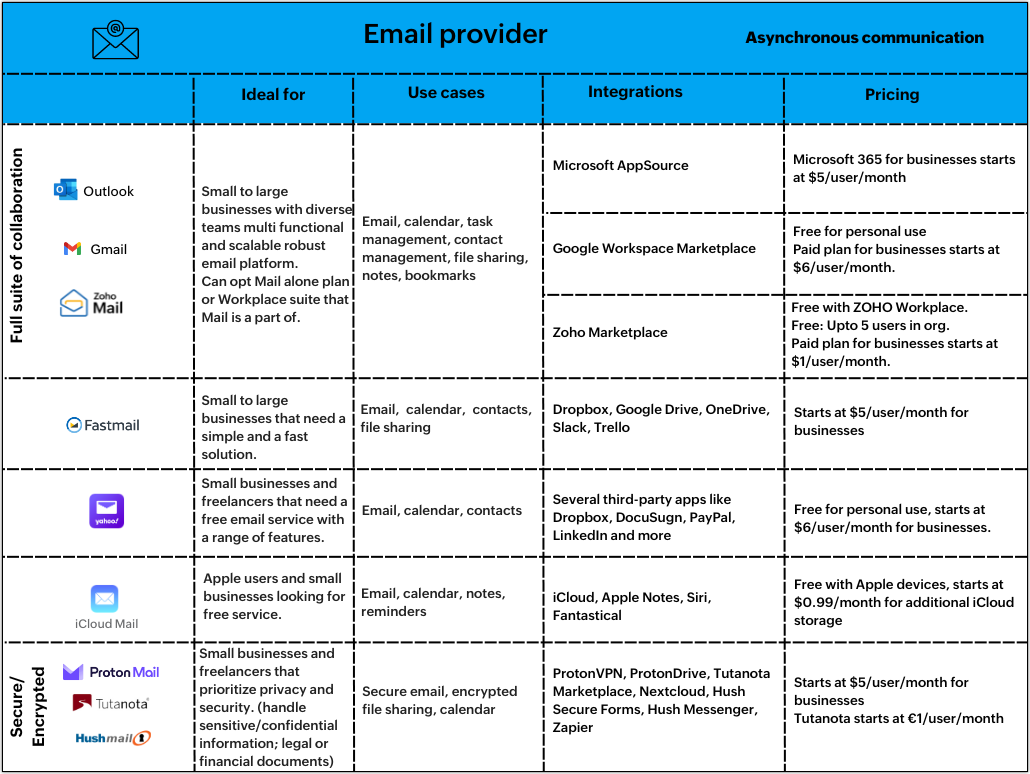
The challenges of business email: space, attachment size, privacy, and security
Despite the numerous advantages of email in business, there are also certain challenges that organizations must address to ensure seamless communication and data protection.
- Limited storage space: With the constant influx of email, users often encounter mailbox clutter, hindering efficient email management and productivity. Organizations need to strike a balance between providing sufficient storage capacity and managing the costs associated with storage solutions. Cloud-based email hosting services have emerged as a practical solution, offering scalable storage options to accommodate growing email volumes while minimizing administrative burdens.
- Attachment size limitations: Business emails may encounter attachment size limitations, hampering the smooth exchange of large files. This challenge is particularly prevalent in on-premise email hosting environments with constrained server capacities. To address this limitation, organizations often turn to additional file-sharing platforms or cloud-based storage services, which allow for seamless sharing of large files while reducing email server load.
- Email retention policies: Email retention poses a significant challenge for businesses in the workplace. With the volume of emails exchanged daily, managing and retaining relevant communications for specified periods becomes crucial for compliance with legal and regulatory requirements. Failure to manage email retention effectively can result in legal and financial consequences, as non-compliance may lead to penalties and reputational damage. Additionally, the sheer volume of emails can strain email storage resources, leading to increased costs and potential performance issues. Businesses must adopt email archiving solutions to ensure long-term storage and easy retrieval of historical emails while adhering to compliance standards.
- Privacy and security concerns: In workplaces, business emails raise substantial privacy and security concerns due to the sensitive information they carry. Unauthorized access to email accounts can result in data breaches, compromising confidential business data. Phishing attacks and email spoofing attempts may jeopardize cybersecurity and employee credentials. To address these risks, organizations should choose email service providers with robust encryption protocols like SSL/TLS and enable multi-factor authentication. Additionally, providing security awareness training to employees is crucial to safeguard the integrity of business communications and mitigate potential threats.
Empowering business efficiency
With increasing reliance on mobile devices, business email services have evolved to offer dedicated mobile apps that provide seamless access and responsiveness no matter where you are. Synchronization between mobile devices, desktop clients, and smart watches ensures consistent access to emails, calendars, and contacts, enabling efficient time management and task prioritization.
Integrations with productivity tools, like task managers and project management platforms, allows users to turn emails into actionable tasks, sync calendars, and collaborate on projects directly from their inboxes. Additionally, integration with video conferencing apps facilitates seamless scheduling of virtual meetings and invites via email, enhancing remote team collaboration.
Email service integrations with various business tools benefit different personas in the workplace. Sales executives gain access to CRM tools for personalized communication, email tracking, and meeting scheduling. HR managers simplify recruitment with applicant tracking systems, automating onboarding and communication. IT administrators receive real-time alerts for issue resolution and can integrate emails with ticketing systems.
The evolving features of business emails
In the ever-evolving landscape of business emails, several features have emerged to enhance productivity and efficiency:
- Advanced search and filtering: The introduction of advanced search and filtering options allows users to swiftly locate specific emails, attachments, or conversations, streamlining email management. Users can find crucial information by using keyword-based searches, date range filters, and sender/recipient categorization.
- Offline access: With offline access, users can access their emails even without an internet connection, ensuring uninterrupted productivity while traveling or in areas with limited connectivity. Offline access allows users to read, compose, and draft emails, which automatically sync once the device reconnects to the internet.
- Real-time collaboration and templates: Real-time collaboration features facilitate multiple users editing and commenting on a single email simultaneously, fostering quick decision-making and enhancing team efficiency. Additionally, email templates enable users to create standardized email formats, streamlining repetitive communications and saving time.
- Shared mailboxes: Shared mailboxes allow teams to access and respond to emails from a shared email address, which is ideal for customer support teams or project-specific communications, ensuring timely responses and better coordination.
- Enhanced security measures: In the face of rising cyber threats, business email services have embraced advanced security measures to safeguard sensitive information. End-to-end encryption shields communications from unauthorized access, ensuring data confidentiality. Multi-factor authentication enhances access security, thwarting potential breaches. Robust spam filters and AI-powered email security tools detect phishing attempts, malware, and suspicious activities, providing a secure email environment. These advanced security features fortify business email services, protecting vital information and maintaining organizational integrity.
The advent of AI in business emails
- AI-driven mail replies: AI-powered email platforms leverage sophisticated natural language processing (NLP) algorithms to offer contextually appropriate suggestions including relevant contacts, attachments, and even suggested subject lines, streamlining the email composition process and saving time for users.
Moreover, with the emergence and integration of advanced language models like ChatGPT and BARD, AI-driven email replies have transcended from mere suggestions to dynamic, interactive responses. These language models can generate entire email responses and engage interactions with recipients on behalf of users, incorporating a deeper understanding of context and user preferences. - Predictive email prioritization: Leveraging machine learning, AI algorithms analyze email content and user behavior to predict which emails are most important to individual users. By automatically prioritizing essential messages, AI-driven email services allow users to focus on critical communications while reducing distractions from non-urgent emails.
- Sentiment analysis: Advanced AI capabilities extend to sentiment analysis, helping users gauge the tone and emotion in received emails. This feature assists in understanding the underlying context of email exchanges, leading to more empathetic and effective responses.
- AI-powered email security tools: Machine learning detects and thwarts phishing attempts, malware attachments, and suspicious activities. By continuously learning from emerging threats, these tools offer robust protection against sophisticated cyberattacks, safeguarding sensitive data and maintaining email integrity.
- Email performance analytics: Comprehensive email analytics provide valuable insights into the effectiveness of email campaigns, open rates, click-through rates, and user engagement. By analyzing these metrics, businesses can refine their email strategies and enhance communication with their target audiences.
Conclusion
Business emails have undergone a transformative journey from being a simple means of communication to becoming an integral part of modern workplace productivity and efficiency. With various hosting options, a diverse vendor landscape, and integration with other business tools, business email services such as Zoho Mail cater to specific organizational needs while ensuring seamless communication and collaboration.
While challenges related to space, attachment size, privacy, and security persist, advancements in features and the advent of AI-driven capabilities offer promising solutions. AI-powered features, such as smart replies and advanced email security tools, contribute to a safer and more productive email environment, empowering organizations to embrace the full potential of business emails in the evolving digital landscape. By leveraging the benefits of business emails and staying attuned to technological advancements, businesses can foster efficient communication, collaboration, and growth in the modern workplace.
This article is co-authored by Sandeep Kotla and Vignesh S.
Sandeep is an accomplished inbound marketer at Zoho Corporation, specializing in digital workplace strategies, digital transformation initiatives, and enhancing employee experiences. Previously, he handled analyst relations and corporate marketing for Manage Engine (a division of Zoho Corp) and its suite of IT management products. He currently spends most of his time re-imagining and writing about how work gets done in large organizations, reading numerous newsletters, and Marie Kondo-ing his inbox.
Vignesh works as a Marketing Analyst at Zoho Corporation, specializing in content initiatives and digital workplace strategies. He's a passionate creator with a penchant for marketing and growth. In his free time, you can see him shuffling between books, movies, music, sports, and traveling, not necessarily in the same order.
